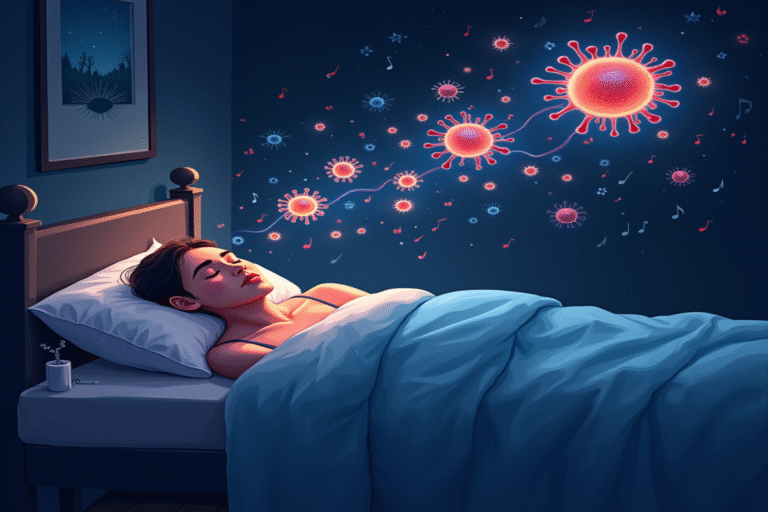Most of us know that skimping on sleep can leave us feeling foggy and irritable, but the relationship between sleep and our immune system runs far deeper than many realize. The connection is so profound that even modest sleep deprivation can alter your body’s defense system within hours—leaving you vulnerable in ways science is only beginning to understand.
The Nighttime Immune Symphony
While you sleep, your immune system is actively at work. Sleep provides a critical window for immune maintenance and regulation. During deep sleep phases, your body releases cytokines—specialized protein messengers that help coordinate your defense against pathogens. These chemical signals guide immune cells, much like conductors lead an orchestra.
Your immune system also works according to a circadian rhythm that syncs with your sleep cycle. Between midnight and 3 AM, your body typically produces more immune cells and antibodies than at other times—this programmed immune activation occurs during your normal sleep hours, even if you are awake.
The Shocking Immune Collapse
When you lose sleep, this carefully coordinated immune activity is disrupted in important ways:
- Natural killer cell activity drops sharply — After just one night of 4-5 hours of sleep, these vital cells that target cancer and virus-infected cells decrease by up to 70%. It’s like losing most of your security team during a critical time.
- Inflammation increases — Sleep loss causes your body to release more inflammatory cytokines, such as interleukin-6 and TNF-alpha. This can result in chronic low-grade inflammation, a factor in many diseases.
- T-cell function weakens — Sleep deprivation impairs the ability of T-cells to latch onto and destroy infected cells. The adhesion molecules that help these cells “stick” to their targets are significantly reduced after sleep loss.
- Antibody production decreases — Research shows that vaccines are less effective in sleep-deprived people because they produce fewer protective antibodies. For example, individuals who got less than 6 hours of sleep the night after a hepatitis B vaccination had less than half the antibody levels of those who were well-rested.
The 48-Hour Vulnerability Window
One of the most concerning discoveries is the “vulnerability window.” After just 48 hours of poor sleep, the protective barriers in your respiratory tract are significantly weakened. The tiny cilia that normally sweep away germs slow down, and the protective mucus layer becomes thinner—leaving your airways less defended.
This was highlighted in a study at Carnegie Mellon University: people who were sleep-deprived and exposed to the rhinovirus were nearly three times more likely to catch a cold than those who slept 8 hours. This effect was even stronger than the impacts of smoking, age, or stress.
Sleep Loss: A Gateway to Serious Illness
Beyond the common cold, chronic sleep deprivation has been linked to:
- Respiratory infections: Higher risk of pneumonia, influenza, and other lung infections
- Delayed healing: Wounds and injuries heal up to 60% more slowly because sleep loss impairs growth hormone production needed for tissue repair
- Viral reactivation: More frequent outbreaks of viruses like herpes and shingles due to weakened immune monitoring
- Autoimmune disorders: Increased risk of conditions such as rheumatoid arthritis, where the immune system attacks healthy tissues
- Compromised vaccination: Lower antibody response to vaccines, potentially reducing their effectiveness by half
The DNA Damage Connection
Research from the University of Hong Kong has shown that sleep deprivation damages the DNA in immune cells. Without enough sleep, immune cells can develop genetic mutations and chromosomal changes. This damage not only weakens their immediate function but may also have lasting effects on immune memory and response.
The Microbiome Link
Another discovery is that sleep deprivation affects your gut microbiome—the vast population of bacteria in your digestive system. After just two nights of restricted sleep, the balance of good and bad bacteria changes significantly. Since about 70% of your immune system is in your gut, these changes can further lower your immune defenses.
Can You “Catch Up” on Immune Function?
While your body does try to recover during periods of good sleep, some immune changes don’t return to normal right away. Research suggests that people who regularly sleep less than six hours per night have an immune system that ages faster—a condition known as “immunosenescence.” This can make a 30-year-old’s immune system function more like that of someone much older.
Protecting Your Immune Shield
The good news is that improving sleep can quickly boost immune function. Even a nap of 30-45 minutes can partially reverse the negative effects of a poor night’s sleep on stress hormones and immune health.
Quality of sleep is just as important as quantity. Deep sleep is when most immune repair happens. Creating a sleep-friendly environment that is dark, cool, and quiet helps ensure you get the rest your body needs.
Prioritizing consistent, good-quality sleep may be one of the most effective ways to strengthen your body’s natural defenses. The next time you’re tempted to stay up late, remember: those extra hours awake may cost you more than just energy—they could be weakening your immune system, making you more vulnerable to illness.





